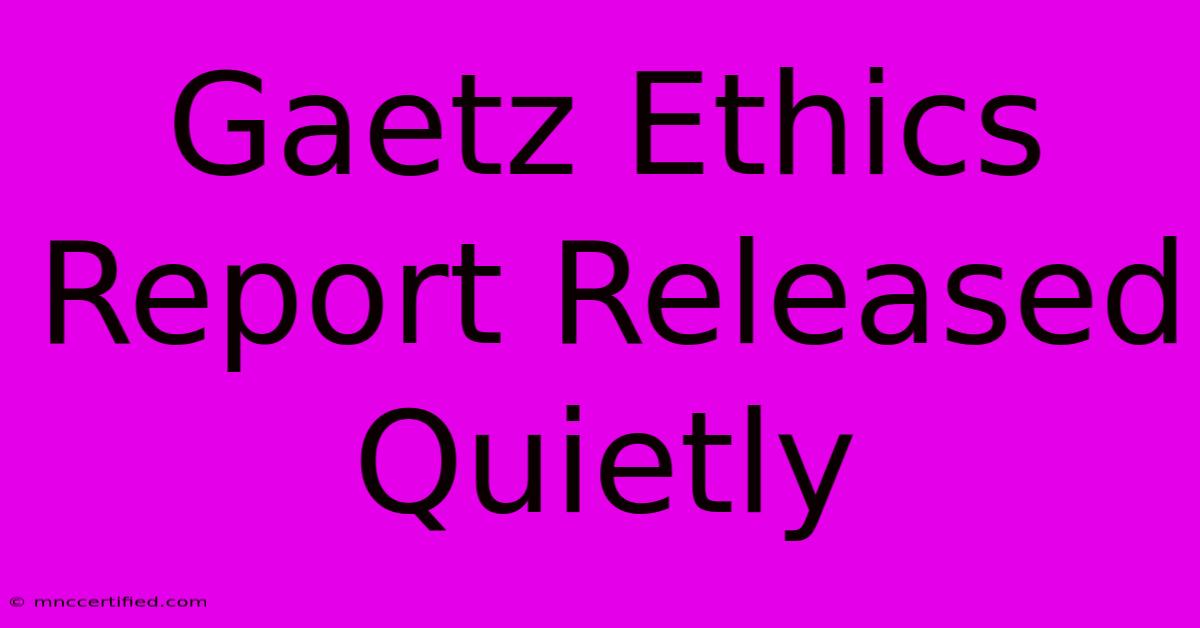Gaetz Ethics Report Released Quietly

Table of Contents
Gaetz Ethics Report Released Quietly: What You Need to Know
The House Ethics Committee's report on Rep. Matt Gaetz's conduct was released with little fanfare, leaving many questioning the process and its conclusions. This quiet release raises concerns about transparency and accountability within Congress, prompting scrutiny of the investigation's findings and their implications. This article delves into the details surrounding the report's release, examines the criticisms leveled against it, and explores the broader context of ethical concerns in American politics.
The Quiet Release and its Implications
The release of the report, seemingly buried amidst other news, fueled immediate speculation. Many critics argue the quiet release suggests an attempt to minimize public attention and avoid potential political fallout. This lack of transparency undermines public trust in the integrity of congressional investigations. The quiet nature of the release itself became a story, overshadowing, for some, the actual contents of the report. This raises questions about whether the process was designed to be truly impartial and effective. The absence of a press conference or public statement from the committee further exacerbated these concerns.
Key Questions Raised by the Quiet Release:
- Was the timing intentional? The release date and method strongly suggest a deliberate effort to avoid media scrutiny.
- Does this indicate a cover-up? The lack of transparency fuels speculation that the committee attempted to bury potentially damaging information.
- What does this say about the House Ethics Committee's effectiveness? The quiet release calls into question the committee's commitment to transparency and accountability.
- How can public trust be restored? The handling of this investigation severely impacts the public's faith in the ethical conduct of their representatives.
Content of the Gaetz Ethics Report: A Summary and Analysis
While the exact details within the report remain subject to interpretation and varied reporting, several themes consistently emerge. The investigation reportedly focused on allegations of sexual misconduct and potential violations of House rules. The key areas generally reported included:
- Allegations of sexual misconduct: The investigation likely examined various claims related to inappropriate behavior and potential abuse of power.
- Campaign finance violations: The report probably addressed questions surrounding the use of campaign funds and compliance with campaign finance laws.
- Conflicts of interest: Possible conflicts of interest stemming from Gaetz's actions and associations were likely examined.
The specific conclusions of the investigation, however, remain unclear due to the limited public access and the lack of detailed information released by the Committee. The overall assessment of whether Rep. Gaetz's conduct violated any rules or laws remains ambiguous to the public.
Criticism and Controversy Surrounding the Report:
The muted release of the Gaetz ethics report has been met with widespread criticism from both Democrats and Republicans. Common points of contention include:
- Lack of transparency: The quiet release and limited public information severely hamper public understanding and trust in the process.
- Potential bias: Concerns remain about whether political considerations influenced the investigation and its outcome.
- Insufficient accountability: Critics argue that the report's perceived lack of detail fails to provide sufficient accountability for any alleged wrongdoing.
The Broader Context: Ethics and Accountability in American Politics
The Gaetz ethics report and its quiet release highlight a larger problem within American politics: a persistent lack of robust ethics oversight and accountability mechanisms. The case underscores the need for:
- Increased transparency in ethics investigations: The public deserves access to the findings of these investigations to ensure fairness and accountability.
- Strengthened ethics rules and enforcement: Congress needs to strengthen its ethical rules and improve enforcement mechanisms to deter misconduct.
- Independent oversight: An independent body, free from partisan influence, could improve the integrity and impartiality of ethics investigations.
The quiet release of the Gaetz ethics report is not just a singular incident; it's a symptom of a deeper issue. Until real reforms are implemented to improve transparency and accountability in Congress, similar situations will likely continue to erode public trust in American political institutions. This situation calls for rigorous public discourse and demand for greater transparency from elected officials and oversight bodies.

Thank you for visiting our website wich cover about Gaetz Ethics Report Released Quietly. We hope the information provided has been useful to you. Feel free to contact us if you have any questions or need further assistance. See you next time and dont miss to bookmark.
Featured Posts
-
Master Chefs Gregg Wallace Replaced
Dec 19, 2024
-
Cody Gakpo Answers Christmas Dilemmas
Dec 19, 2024
-
Obituary Eddie Stobarts Legacy
Dec 19, 2024
-
Busy Bridge Shuts Rush Hour Chaos
Dec 19, 2024
-
Trump Wins Gops January 6th Decision
Dec 19, 2024